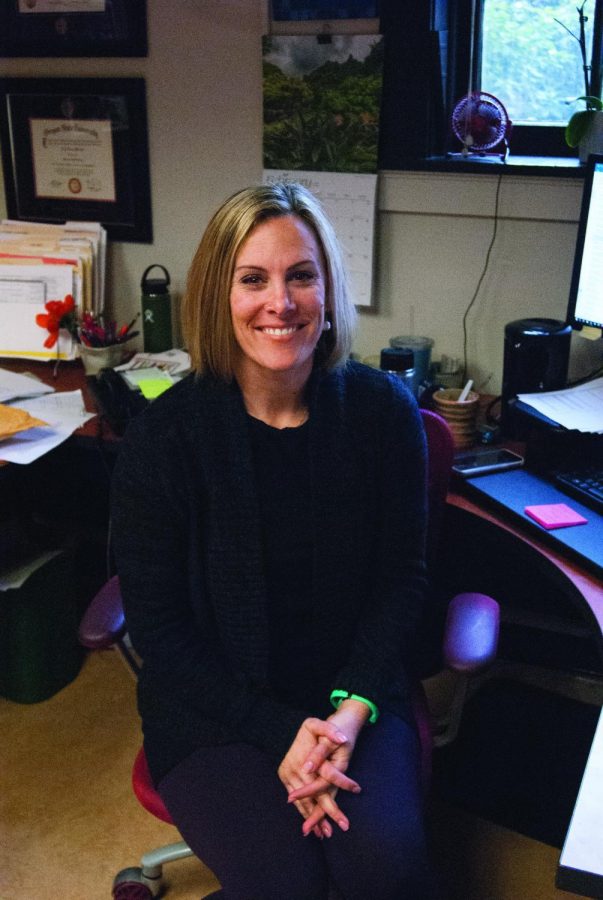Professors balance mental health with work
February 11, 2019
Sometimes working 11-hour days filled with teaching, running committees and grading papers, professor of lifetime fitness for health, Erica Woekel, could find herself staying on campus from 7 a.m. to 6 p.m. Despite the long days, Woekel said one of her favorite parts of her job is making one-on-one connections with students and learning their stories.
“In regards to academics, we are supposed to know everything, but I always tell people I don’t know everything,” Woekel said.
Woekel’s favorite things to do to destress includes playing with her dogs, jewelry making and henna tattoos.
Mike O’Malley, an education professor at Oregon State University, believes that genuine care and support towards his students is absolutely necessary in their careers. O’Malley believes the true magic in a classroom happens when he cares about his students and they care in return.
One of the struggles teachers have is “taking their job home with them”. Although there will always be grading to do on the weekends and lesson plans waiting to be made, some of the emotional aspects of being a teacher that students respect and look up to can follow them home.
“If you care and you want what’s best for your students, of course things come home with you,” O’Malley said. “I have a very hard time detaching, but the funny thing is I don’t really want to detach. If I don’t detach though, I won’t get the space I need to re-energize.”
Woekel believes some of the pressures associated with teaching would be easier to handle with certain skills and resources, and if people can find them, their jobs will be easier.
“In a smaller town, I think it’s harder to seek out resources when you have problems. I try to be open about who I am and what I deal with, and I’m wanting to reduce the stigma around it. But it’s hard to meet a new counselor and have to explain everything again. If people can find someone to help them work through things and not judge them, it’s great,” Woekel said.
Lynette Black, associate professor and coordinator of 4-H youth development, helps middle school and high school students learn healthy coping mechanisms for stress and emotional strife. Through 4-H training, students of all ages can learn and practice skills they will use in everyday life, such as team motivation and encouragement, stress management, emotional awareness and interpersonal communication.
“Emotional intelligence and learning stress management and positive coping skills should be taught to all children,” Black said, via email. “Life is stressful and interpersonal skills and good mental health are important for all. How quickly the counselor’s pick up the skills is related to where they are in their journey to maturity and the level of knowledge and skills they already possess.”
4-H camps are a great opportunity for younger students because along with emotion and stress management skills, students also learn lots of subliminal lessons about interpersonal communication, which are skills used in adolescence and adulthood.
“According to a longitudinal study by Tufts University, 4-H member are four times more likely to make contributions to their community and two times more likely to be civically active than youth not involved in 4-H,” Black said, via email. “They are also two times more likely to make healthy choices and have higher levels of academic competence and engagement. In general the 4-H program, which focuses on positive youth development, places youth on a thriving trajectory.”
Overall, it is important for teachers and students to find what works for them when they need to destress. O’Malley loves reading and exercising, and Woekel loves art, jewelry making, and henna. According to Woekel, mental health needs more attention across the board.
“If there’s ever a concern of ethics, professors can go to EOA for help,” Woekel said. “When I need something though, I typically go to my medical provider, which is a perk teachers get for working here. As far as emotional matters go, though, I tend to like to do things on my own-especially since I’m always with lots of people at work.”
O’Malley uses his spare time to do things on his own, too.
“I do a lot of bibliotherapy,” O’Malley said. “Reading is what helps the most. I find the books fascinating, and when I read I go somewhere else. I’ve done it my whole life. I’m also very lucky I have a wife that listens to me. I can process my emotions with her, and she’s very therapeutically savvy.”
Woekel’s mantra to herself when she needs it is “Be present, be kind, you’ve got this.”
“Education can be draining, and it’s awesome to hear people tell you what they think you’re doing well.” Woekel said. “Gratitude can go a long way. People in general, we’ve all got our stories, and sometimes life sucks. I think that everybody should have a counselor or a mental health professional they go to see from time to time.










































































































